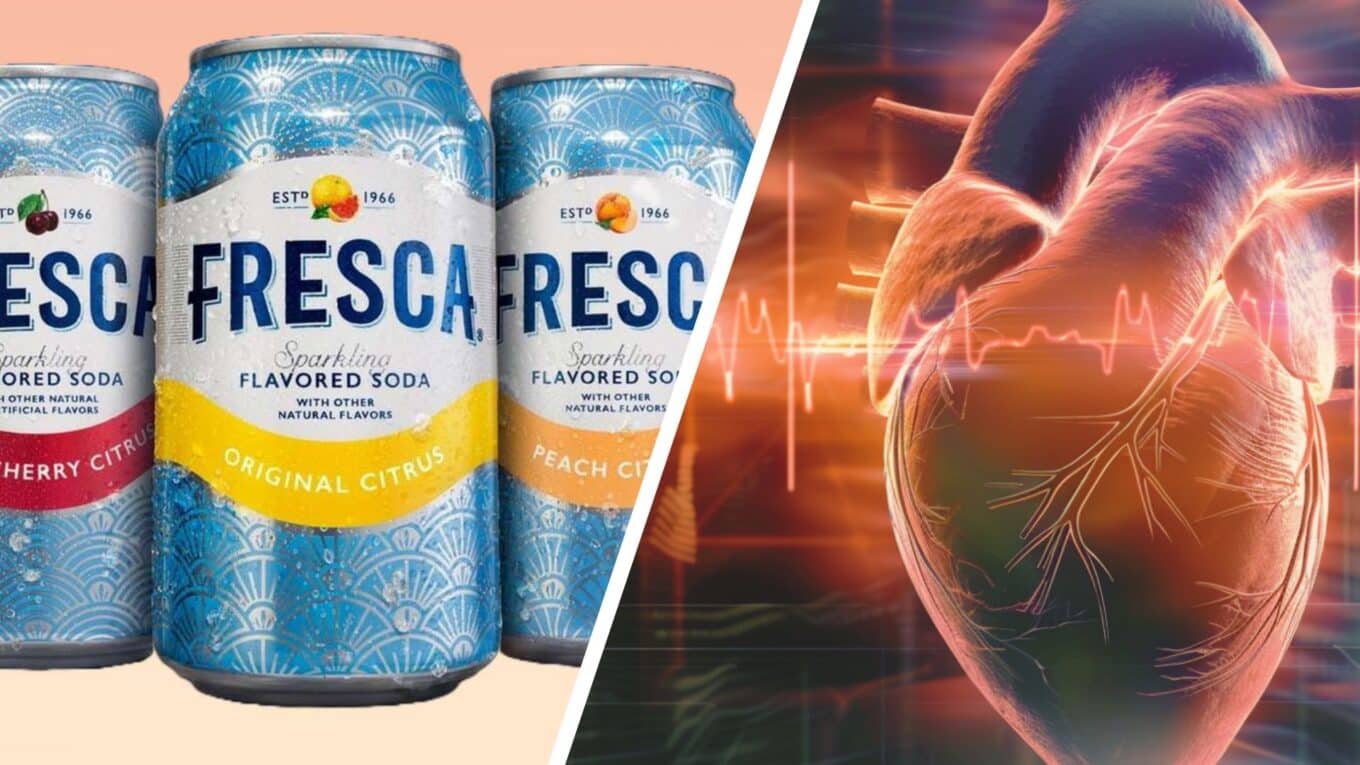Many people enjoy the refreshing taste of Fresca, the popular zero-calorie, grapefruit-flavored sparkling beverage.
However, consuming this artificially sweetened drink regularly may come with potential health risks that you should be aware of.
In this article, we’ll explore the various ingredients in Fresca, such as aspartame and acesulfame potassium, and their possible effects on your well-being.
We’ll also discuss how Fresca’s citric acid can impact dental health and why moderation is key to enjoying this beverage.
By the end of this post, you’ll better understand the potential health risks associated with drinking Fresca and be equipped to make informed decisions about your consumption habits.
Core Composition of Fresca
To understand the potential health risks of consuming Fresca, it’s essential to take a closer look at its key components:
| Ingredient | Purpose | Health Risks |
|---|---|---|
| Carbonated Water | It forms the base of the beverage and provides fizziness. | Generally safe, with no direct health risks. |
| Citric Acid | It adds a tangy flavor and acts as a preservative. | It can erode tooth enamel, increasing the risk of cavities. |
| Aspartame | Low-calorie sweetener providing sweetness. | Linked to headaches, neurological issues, and potential cancer risks (controversial). |
| Acesulfame Potassium | Low-calorie sweetener used alongside aspartame. | Possible link to metabolic disruption and cancer risks (controversial). |
| Potassium Benzoate | A preservative that extends shelf life. | It can form benzene, a carcinogen, under certain conditions. Also linked to allergic reactions. |
| Other Additives | Enhance flavor and appearance. | Depending on specific additives, some may cause sensitivities or allergies. |
Nutritional Information
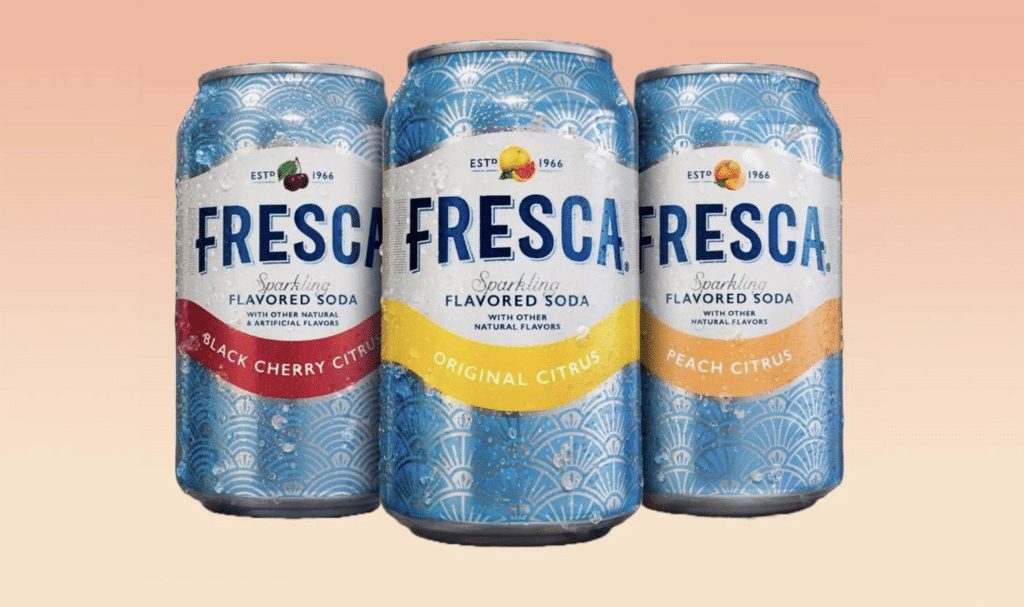
- Key Nutritional Highlights: One of Fresca’s main selling points is its zero-calorie content, achieved by replacing sugar with artificial sweeteners. A 12-ounce can of Fresca contains no fat, sugar, protein, or carbohydrates, making it a popular choice among calorie-conscious consumers.
- Appeal to Target Audience: Fresca’s absence of calories can be particularly appealing to people who are trying to manage their weight or control their sugar intake, such as those with diabetes. By offering a sweet, flavorful beverage option without the added calories or sugar, Fresca allows individuals to enjoy a refreshing drink while still adhering to their dietary goals.
- Potential Misconceptions and Clarifications: Although Fresca’s zero-calorie status may seem like a healthier alternative to regular soda, it’s important to note that the artificial sweeteners used in the drink can still impact the body. Some studies suggest artificial sweeteners may influence metabolism, insulin response, and appetite regulation. Therefore, while Fresca may not directly contribute to weight gain due to its lack of calories, consuming it in moderation is crucial as part of a balanced diet.
Potential Health Risks
1. Dental Health Concerns
One of the main issues with consuming Fresca regularly is its potential impact on dental health.
To better understand this risk, let’s examine a graph that plots the pH levels of various beverages, including Fresca and their potential for causing enamel erosion.
This visualization will highlight where Fresca stands regarding acidity compared to other common drinks.
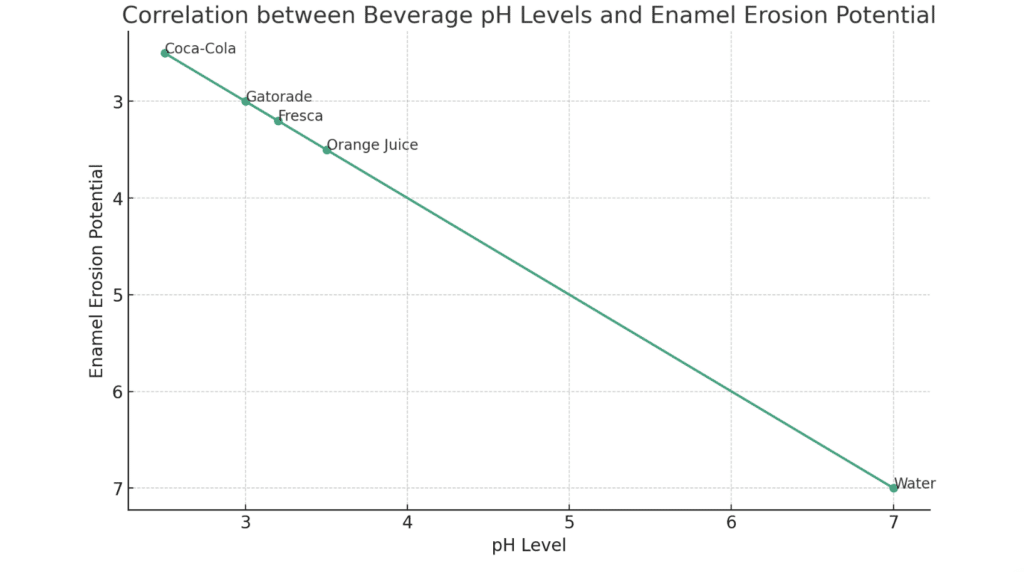
The graph illustrates that Fresca’s pH level is significantly lower than neutral water but not as low as some sodas, indicating a moderate risk of enamel erosion.
Regular exposure to such acidity can weaken dental enamel over time, leading to increased dental sensitivity and higher cavity risks.
To minimize these effects, it’s advisable to rinse your mouth with water after drinking Fresca and to avoid brushing your teeth immediately after consumption, as this can further damage the softened enamel.
While providing a refreshing tang, the citric acid in the beverage can gradually erode tooth enamel over time.
This erosion makes teeth more vulnerable to decay, increasing the risk of cavities and sensitivity. To minimize these effects, it’s advisable to rinse your mouth with water after drinking Fresca and to avoid brushing your teeth immediately after consumption, as this can further damage the softened enamel.
2. Artificial Sweeteners and Health
Fresca contains two artificial sweeteners: aspartame and acesulfame potassium. Although regulatory agencies generally consider these sweeteners safe, some studies have raised concerns about their potential health risks.
Aspartame has been linked to headaches and, in rare cases, more severe neurological symptoms.
Both sweeteners have also faced scrutiny over their possible connections to cancer and metabolic disruption, though more research is needed to confirm these associations.
People with phenylketonuria (PKU), a rare genetic disorder, should avoid aspartame altogether, as it can be harmful to their health.
3. Preservatives and Additives
To maintain its shelf life and appearance, Fresca includes preservatives such as potassium benzoate and EDTA.
While these additives are approved for food and beverages, they have been associated with certain health concerns. When combined with vitamin C, potassium benzoate can form benzene, a known carcinogen.
EDTA, which helps preserve color, has been linked to issues like kidney damage when consumed in high quantities.
Although the levels of these preservatives in Fresca are regulated, it’s important to be aware of their presence and potential risks, especially for those with sensitivities or allergies.
4. Role of Acidic Content
Fresca, like many carbonated beverages, has a low pH level, making it acidic. This acidity, primarily attributed to the citric acid content, can irritate the stomach lining and worsen conditions such as acid reflux or gastroesophageal reflux disease (GERD).
Consuming Fresca may cause discomfort, bloating, or heartburn in individuals with sensitive digestive systems or pre-existing gastrointestinal issues.
To minimize these risks, it’s best to enjoy Fresca in moderation and to avoid drinking it on an empty stomach or before bedtime.
Discussion on Weight Management
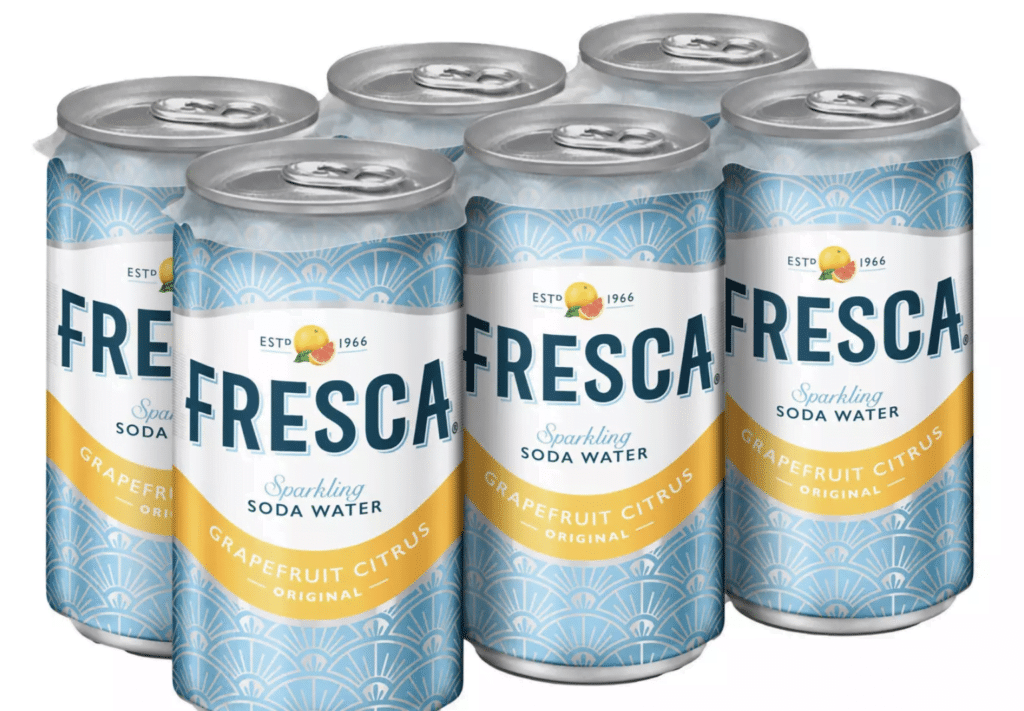
1. Low-Calorie Benefits
One of the main reasons people choose Fresca is its zero-calorie content, which can be attractive for those trying to manage their weight.
By replacing sugary drinks with a calorie-free alternative like Fresca, individuals can potentially reduce their overall calorie intake, which is a key factor in weight loss and maintenance.
However, it’s important to consider whether relying on zero-calorie beverages is a sustainable and effective long-term strategy for weight management.
While it may help in the short term, developing healthy eating habits and practicing moderation in all aspects of one’s diet is crucial for lasting success.
2. Artificial Sweeteners’ Role in Appetite
Fresca achieves its sweetness through artificial sweeteners, namely aspartame and acesulfame potassium.
These sugar substitutes have been the subject of much debate regarding their impact on appetite and weight management.
Some studies suggest that artificial sweeteners can help reduce overall calorie consumption by satisfying sweet cravings without adding calories.
On the other hand, other research indicates that these sweeteners may stimulate appetite and increase cravings, potentially leading to weight gain in some individuals.
The psychological and physiological effects of artificial sweeteners on the body are complex. Due to the sweet taste, the body may anticipate the arrival of calories when consuming these sweeteners.
However, since no calories are delivered, this can lead to confusion in the body’s metabolic responses, potentially triggering increased hunger and cravings.
This effect may vary from person to person, and more research is needed to fully understand the long-term implications of artificial sweetener consumption on weight management.
Comparative Analysis with Other Beverages
1. Comparison with Other Zero-Calorie Sodas
When evaluating Fresca’s potential health risks, comparing its composition to other popular zero-calorie sodas is useful.
While all diet sodas are designed to offer a low-calorie alternative to sugary drinks, their ingredients and associated health risks can vary significantly.
To illustrate these differences more clearly, let’s look at a comparative bar chart that outlines the number of health complaints or issues, such as dental problems, cancer risks, and metabolic disturbances linked to various zero-calorie sodas.
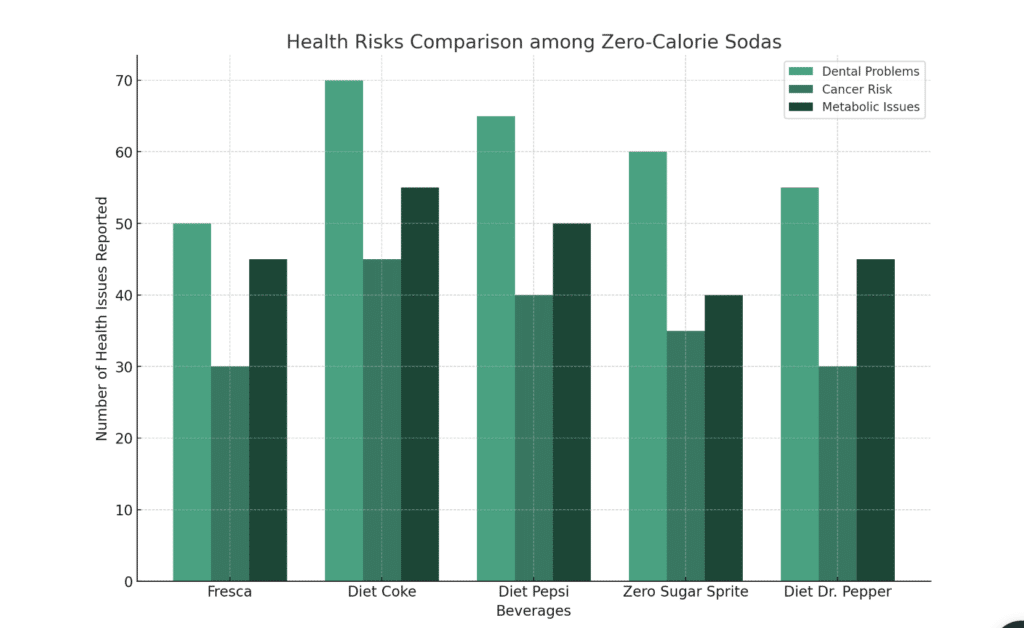
The bar chart reveals that while Fresca shares similar risks for dental erosion with other diet beverages, it may have lower or comparable incidences of cancer risks compared to some alternatives that use different artificial sweeteners.
However, its impact on metabolic health remains a concern, as highlighted by the frequency of related complaints across all products.
This comparative analysis underscores the importance of choice in diet beverages. For those particularly concerned about metabolic health, considering beverages with natural sweeteners or reducing consumption of all diet sodas might be prudent. Always consult a healthcare provider to align these choices with your health needs.
While Fresca contains aspartame and acesulfame potassium as its primary sweeteners, other diet sodas may use different combinations. For example, Diet Coke and Pepsi Zero rely on aspartame, acesulfame potassium, and sucralose in some variations.
On the other hand, some newer formulations may use natural sweeteners like stevia, potentially influencing health outcomes differently.
Recent studies have explored the varying effects of artificial sweeteners on gut health and glucose metabolism. Some findings suggest that aspartame, in particular, may be associated with certain health risks that are not as evident with natural alternatives like stevia.
However, more research is needed to fully understand the long-term implications of consuming different artificial sweeteners.
Ultimately, while the specific sweeteners used in Fresca and other zero-calorie sodas may differ, they all share the goal of providing sweetness without calories, and their consumption should be moderated as part of a balanced diet.
2. Comparison with Natural Beverage Alternatives (e.g., Fruit-Infused Water)
It’s worth comparing Fresca to natural alternatives like fruit-infused water when considering healthier beverage options.
The primary difference lies in their nutritional content and the presence of artificial ingredients. Fruit-infused water adds fresh fruits like berries, citrus, or herbs to plain water, infusing it with natural flavors and nutrients.
Unlike Fresca, these beverages do not contain artificial sweeteners, preservatives, or additives, making them a more wholesome choice for those seeking to avoid synthetic ingredients.
In addition to the absence of artificial components, natural beverages like fruit-infused water can offer various health benefits.
The fruits used in these infusions can provide essential vitamins, minerals, and antioxidants that support overall health and well-being.
For example, adding lemon to water can boost vitamin C intake, while using berries can provide anti-inflammatory and anti-oxidative properties.
By opting for natural beverages over artificially sweetened sodas like Fresca, individuals can avoid the potential risks of artificial sweeteners while simultaneously enjoying the nutritional benefits of real fruits.
Ultimately, choosing Fresca and natural beverage alternatives depends on personal preferences and health goals.
However, for those prioritizing a more natural and wholesome approach to hydration, fruit-infused water, and other natural beverages may be a safer and more beneficial option in the long run.
Conclusion
While Fresca’s zero-calorie and zero-sugar content may seem appealing, it’s crucial to consider the potential health risks associated with its consumption.
Fresca’s ingredients warrant careful examination, from the erosion of tooth enamel caused by citric acid to the controversial effects of artificial sweeteners on metabolism and appetite.
For those with specific concerns, consulting a healthcare professional can provide personalized guidance on navigating the complexities of artificial sweeteners and additives.
By prioritizing balance and self-awareness, we can make mindful choices that support our well-being in the long run.
Frequently Asked Questions
What is in Fresca that is Bad for You?
Fresca contains artificial sweeteners (aspartame, acesulfame potassium), citric acid, and preservatives that may pose health risks when consumed in excess, such as tooth erosion and metabolic issues.
What Effects Does Aspartame Have on The Body?
Aspartame may cause headaches, dizziness, and, in rare cases, more severe neurological symptoms. Some studies suggest it might disrupt metabolism and increase appetite, potentially leading to weight gain.
Does Fresca Still Contain BVO?
As of 2020, Fresca no longer contains brominated vegetable oil (BVO) in its formulation. The Coca-Cola Company removed this controversial ingredient from the beverage.
Is There Fake Sugar in Fresca?
Yes, Fresca contains artificial sweeteners, specifically aspartame and acesulfame potassium, which are considered fake sugars. These provide sweetness without the calories of regular sugar.
Why Did Fresca Stop Using Green Bottles?
Fresca switched from green to clear bottles in 2018 as part of a rebranding effort to modernize the product’s image and appeal to a wider consumer base.

